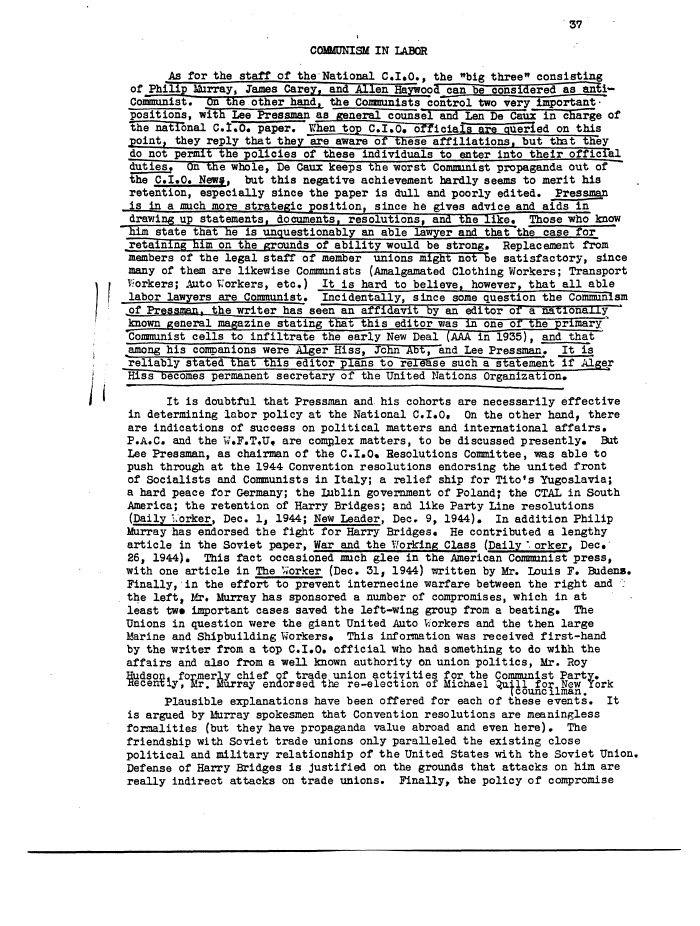 |
||||
 |
||||
| li 37 i COMMUNISM IN LABOR As for the staff of the National C.I.O., the "big three" consisting of _Philip Murray, James Carey, and Alien Haywood can be considered as anti*- Communist^jto the-other hand, the Cojanunists control two very important- positions, with Lee Pressman as general counsel andj.en De Cause in charge of the national C,1.0. paper, jfhen top C»I»0. officials^are queried on tMs jpointy they reply that they "are aware of these affiliations, but that they do not permit the policies of these individuals to enter into their officTal^ duties* On the whole, De Caux keeps the worst Communist propaganda out of ~~ the C.I.O. News, but this negative achievement hardly seems to merit his retention, especially since the paper is dull and poorly edited. Pressman is in a much more strategic position! since he gives advice and aids in drawing up statementsf documents, resolutions, and the like* Those who" know " him state that he is unquestionably an able lawyer and that 'the case for _retaining him on the grounds of ability would be strong. Replacement from members of the legal staff of member unions might not be satisfactory, since many of them are likewise Communists (Amalgamated Clothing Workers; Transport Workers; Auto Workers, etc,) It is hard to believe, however, that all able labor lawyers are Communis-U Incidentally, since some question the Communism .of Pressman f the writer has seen an affidavit by an editor of a na-cionajJ.y known general magazine stating that this editor was in one of the primary * 'Communist cells to infiltrate the early New Deal (AAA in 1935), and that jamong his companions were Alger Hiss, JohnAPt, "and Lee Pressman, It is "reliably stated that this editor plans to 'release such a statement if Alger Hiss becomes permanent secretary of the United Nations Organization* It is doubtful that Pressman and his cohorts are necessarily effective in determining labor policy at the National C.I.O* On the other hand, there are indications of success on political matters and international affairs. P.A.C. and the W.F.T.U* are complex matters, to be discussed presently. But Lee Pressman, as chairman of the C.I.0% Resolutions Committee, was able to push through at the 1944 Convention resolutions endorsing the united front of Socialists and Communists in Italy; a relief ship for Tito's Yugoslavia; a hard peace for Germany; the Lublin government of Poland? the CTAL in South America; the retention of Harry Bridges; and like Party Line resolutions (Daily Worker, Dec. 1, 1944; New Leader. Deer 9, 1944). In addition Philip Murray has endorsed the fight for Harry Bridges« He contributed a lengthy article in the Soviet paper, War and the Working Class (Daily *.' orker. Dec. 26, 1944). This fact occasioned much glee in the American Communist press, with one article in The Worker (Dec, 31, 1944) written by Mr. Louis F, Budens. Finally, in the effort to prevent internecine warfare between the right and '; the left, Mr* Murray has sponsored a number of compromises, which in at • least tw» important cases saved the left-wing group from a beating. The Unions in question were the giant United Auto Workers and the then large Marine and Shipbuilding Workers* This information was received first-hand by the writer from a top C.I.O. official who had something to do wihh the affairs and also from a well known authority on union politics, Mr. Roy Hudson, formerly chief of trade union activities for the Communist Party, Recently, Mr. Murray endorsed the re-election of Michael 'Quill for,New York (councilman. Plausible explanations have been offered for each of these events. It is argued by Murray spokesmen that Convention resolutions are meaningless formalities (but they have propaganda value abroad and even here). The friendship with Soviet trade unions only paralleled the existing close political and military relationship of the United States with the Soviet Union. Defense of Harry Bridges is justified on the grounds that attacks on him are really indirect attacks on trade unions. Finally, the policy of compromise |